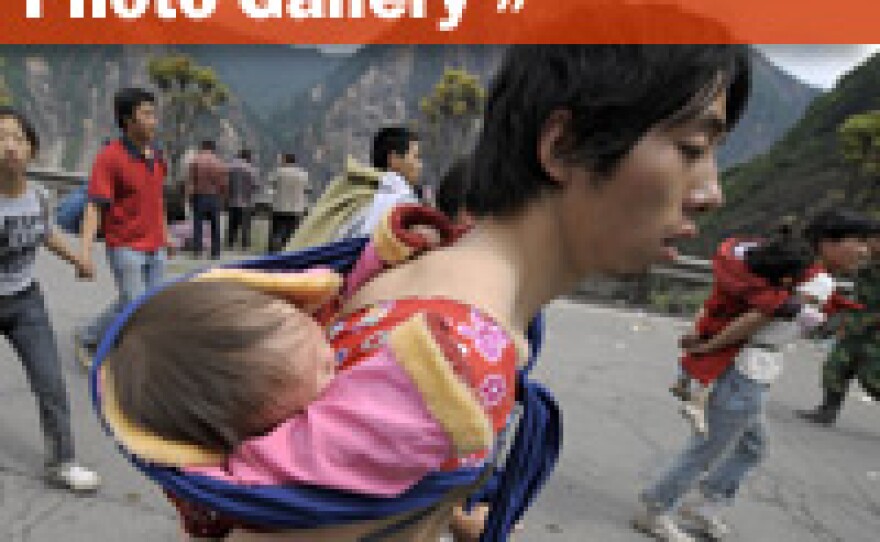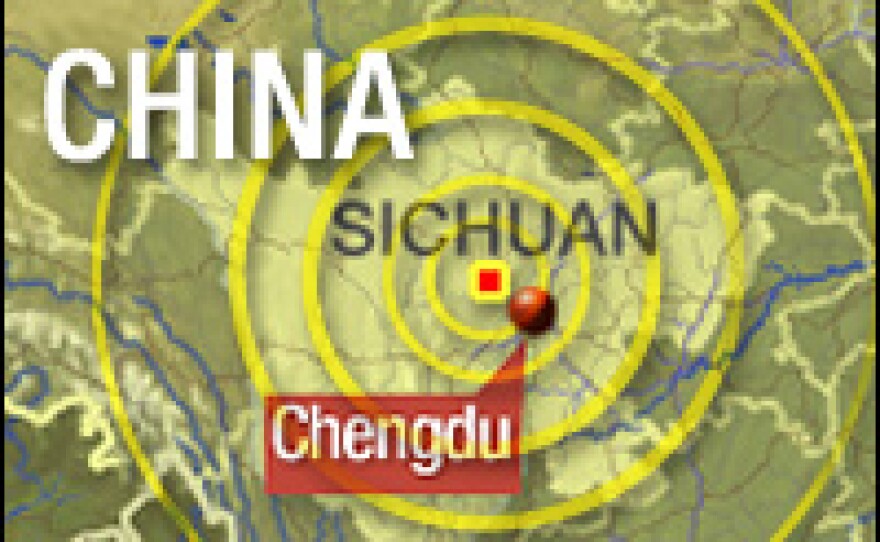

NPR's Andrea Hsu is in the city of Chengdu as part of All Things Considered's weeklong broadcast from China. In a conversation with the Bryant Park Project today, Hsu describes the situation on the ground following Monday's magnitude 7.9 earthquake.
When the ground started shaking, Hsu says, she was with ATC co-host Melissa Block. "We were in Chengdu, in the city, at the seminary. We had just sat down for the interview with a pastor. ... All of a sudden, we heard this rumble. One of his assistants ran out of the room; he followed. They didn't say anything. I could see the ceiling shaking. We ran outside; everybody was pouring out of the building."
Hsu reacts strongly when she hears — for the first time — the tape from that interview, in which Block asks whether they're feeling an earthquake: "It kind of gave me the chills just listening to it and remembering what I was feeling at that time."
She says seeing children trapped was "truly one of the most awful things I've ever seen." She and Block hired two cars to take them to affected areas in the northwest, where they knew a school had collapsed.
"There were hundreds of parents waiting there," Hsu says. "They were desperate for information. ... It soon became apparent that behind us, there were actually families who were already grieving the loss of their sons or daughters. These were bodies that had been pulled out of the wreckage and laid on the ground and identified. They were setting up these makeshift altars, burning incense, burning paper money. We heard firecrackers going off; that's to scare off the ghosts. ... We saw several bodies of children being carried out by rescuers and being laid on the ground, and family members realizing it was their loved one. It was just a horrible scene."
Hsu says the ATC team drove north Tuesday morning, away from the epicenter of the quake, to a county where reports suggested that thousands of people had died and 80 percent of buildings had toppled.
"The further we went, the more devastation we saw," Hsu says. "We saw some buildings that were pretty much intact. Our translator said those buildings were built in the '50s. ... A lot of the newer construction is what had fallen down."
The larger rescue effort is under way, Hsu says. "We saw lots of convoys of army soldiers, driving northward toward that area. We must have seen at least a dozen, if not two dozen, buses full of soldiers going northward. We saw trucks that looked like they had supplies on them."
As the disaster unfolded, nerves began to fray among victims and authorities alike.
"At first, parents seemed very grateful to have somebody to talk to. But then the police stopped us and asked us if we had permission to be there," Hsu says. She says the officers told the crew, "They're grieving! Don't make it worse."
She thinks people in China have grown resentful of reporters from far away after coverage of the Tibetan protests and the Olympic torch run. In the end, the police let them go.
"They detained us for a few minutes," she reports. "I just said, 'Please, please, you have much more important things to deal with.' "
Copyright 2022 NPR. To see more, visit https://www.npr.org. 9(MDAzMjM2NDYzMDEyMzc1Njk5NjAxNzY3OQ001))






